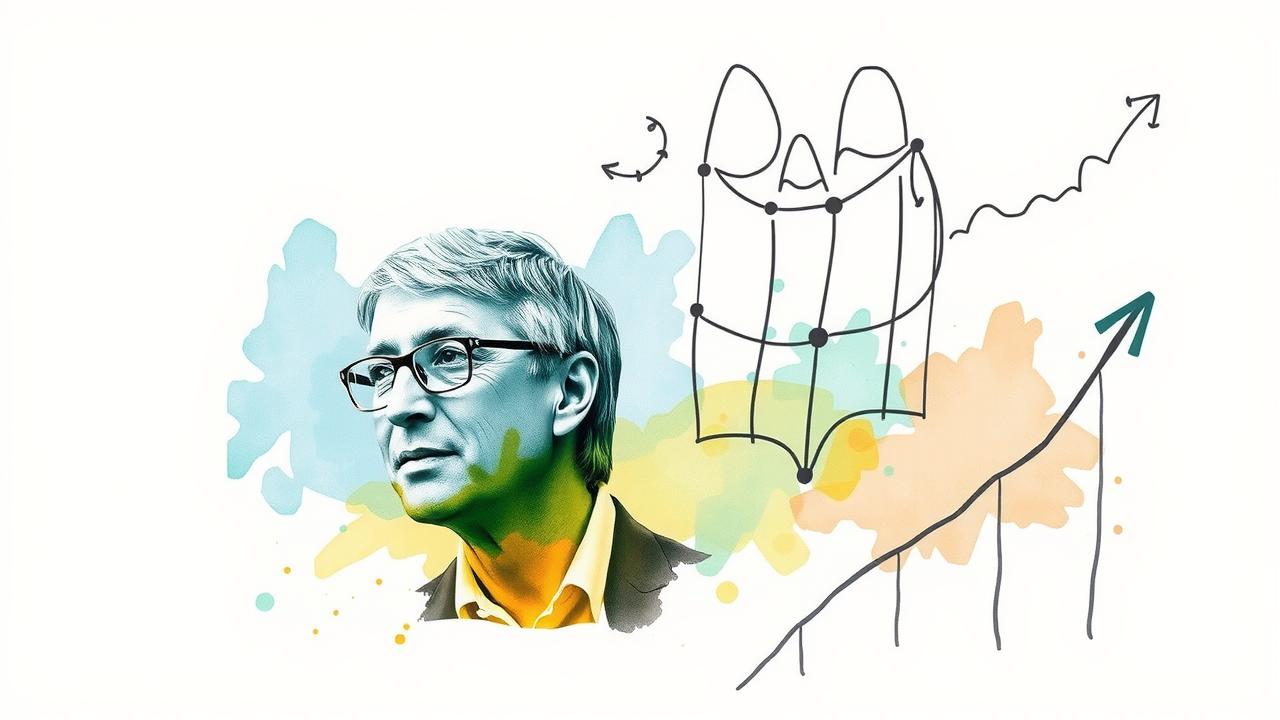Table of Contents
- Bill Gates’ Views on MLM and Network Marketing
- Misunderstandings Around Gates and Network Marketing
- Critiques of MLM Business Models
- Gates’ Emphasis on Philanthropy and Ethics
- No Proof of Gates Endorsing MLM
- Understanding Network Marketing and Its Risks
- Frequently Asked Questions
Bill Gates has never publicly endorsed network marketing or multi-level marketing companies. In fact, he often expresses skepticism about these business models due to concerns about potential exploitation. Many people mistakenly think he supports MLMs because of his focus on entrepreneurship, but his discussions usually highlight more traditional and ethical business practices. MLM structures are often criticized for emphasizing recruitment over product sales, leading to high failure rates for participants. Gates is primarily focused on philanthropy through his foundation, advocating for sustainable and transparent business methods. There’s no credible evidence that he backs any MLMs; claims suggesting otherwise should be approached with caution.
1. Bill Gates’ Views on MLM and Network Marketing
 Bill Gates has not publicly endorsed network marketing or multi-level marketing (MLM) companies. In fact, he has often expressed skepticism about business models resembling MLMs, pointing out the potential for exploitation within these systems. Many people mistakenly believe that Gates supports network marketing due to his focus on entrepreneurship and innovation. However, his discussions usually center around more traditional business practices that prioritize ethical entrepreneurship.
Bill Gates has not publicly endorsed network marketing or multi-level marketing (MLM) companies. In fact, he has often expressed skepticism about business models resembling MLMs, pointing out the potential for exploitation within these systems. Many people mistakenly believe that Gates supports network marketing due to his focus on entrepreneurship and innovation. However, his discussions usually center around more traditional business practices that prioritize ethical entrepreneurship.
One major criticism of MLM structures is their heavy reliance on recruitment rather than actual product sales. This has led to high failure rates for many individuals involved. Gates is known for advocating for education and ethical business practices, which conflicts with the controversial nature of MLMs. Furthermore, his philanthropic work through the Bill and Melinda Gates Foundation highlights his commitment to addressing global challenges such as health and education, rather than promoting specific business models like MLM.
Despite some claims circulating on social media, there is no credible evidence or direct statement from Gates endorsing any MLM companies. It’s essential to approach such claims with caution, as they often stem from misunderstandings or misinterpretations of his views. Overall, Gates’ perspective emphasizes the importance of transparency and sustainability in business, steering clear of the often criticized structures found in MLMs.
2. Misunderstandings Around Gates and Network Marketing
Many people mistakenly believe that Bill Gates supports network marketing due to his emphasis on entrepreneurship and innovation. However, a closer look at his statements reveals a different story. Gates has not publicly endorsed multi-level marketing (MLM) companies, and he often expresses skepticism about their business practices. He highlights the risks involved, particularly the potential for exploitation and the high failure rates for participants. For instance, while discussing business models, Gates tends to favor traditional approaches that prioritize ethical entrepreneurship over recruitment-driven structures typical of MLMs.
This misconception is further fueled by the spread of unfounded claims on social media, where some users misinterpret Gates’ advocacy for business innovation as support for MLM schemes. In reality, his focus lies more on promoting transparent and sustainable business practices through his philanthropic efforts. The Bill and Melinda Gates Foundation aims to address pressing global issues like education and health, steering clear of the controversial nature associated with MLMs. Thus, it’s essential to critically evaluate any assertions suggesting Gates endorses network marketing, as they lack credible evidence and often stem from misinterpretations of his views.
3. Critiques of MLM Business Models
Multi-level marketing (MLM) structures often face scrutiny for various reasons. One major critique is their heavy reliance on recruitment rather than actual product sales. In many MLMs, success hinges on bringing in new members, which can create a cycle where only those at the top benefit. This recruitment focus can overshadow the importance of selling quality products, leading to a situation where the average participant sees little to no profit.
Moreover, the failure rates in MLMs are alarmingly high. Research suggests that a significant percentage of participants lose money, while only a few earn substantial income. This reality contradicts the often-promoted narrative of financial freedom and success that many MLMs advertise. Bill Gates has highlighted the importance of ethical business practices and has expressed skepticism about systems that may exploit individuals, which aligns with these critiques.
Additionally, MLMs can perpetuate a culture of competition among members, which may harm personal relationships. Friends and family can become targets for recruitment, leading to potential conflicts and discomfort. This dynamic contrasts sharply with Gates’ advocacy for sustainable and community-oriented business practices. Ultimately, the critiques of MLM structures raise important questions about their viability and ethics, encouraging potential participants to carefully consider their options before joining.
| Critique | Description |
|---|---|
| Reliance on Recruitment | MLM structures prioritize recruitment over actual product sales, leading to sustainability issues. |
| High Failure Rates | Many individuals involved in MLM typically experience significant financial losses and failure. |
| Ethical Concerns | MLM practices often raise ethical questions, particularly regarding potential exploitation. |
| Lack of Transparency | Many MLMs lack clear and honest communication about earnings and product efficacy. |
| Limited Product Sales | A focus on recruitment rather than product sales can lead to market saturation and business instability. |
4. Gates’ Emphasis on Philanthropy and Ethics
 Bill Gates has consistently highlighted the importance of philanthropy and ethical business practices throughout his career. His focus has been on addressing pressing global issues like health, education, and poverty, primarily through the work of the Bill and Melinda Gates Foundation. This philanthropic approach contrasts sharply with the structures of multi-level marketing (MLM) companies, which often prioritize recruitment over actual product sales. Gates has expressed concerns about the potential for exploitation within MLMs, where individuals may invest significant time and money but still face high failure rates.
Bill Gates has consistently highlighted the importance of philanthropy and ethical business practices throughout his career. His focus has been on addressing pressing global issues like health, education, and poverty, primarily through the work of the Bill and Melinda Gates Foundation. This philanthropic approach contrasts sharply with the structures of multi-level marketing (MLM) companies, which often prioritize recruitment over actual product sales. Gates has expressed concerns about the potential for exploitation within MLMs, where individuals may invest significant time and money but still face high failure rates.
While some may mistakenly believe that Gates supports network marketing due to his advocacy for entrepreneurship, his public statements generally steer away from endorsing such business models. Instead, he promotes sustainable and transparent practices that foster genuine economic growth. For instance, his discussions around entrepreneurship often focus on innovative solutions that provide real value to communities, rather than the often controversial and high-risk nature of MLM schemes.
In essence, Gates’ legacy is rooted in promoting ethical entrepreneurship and philanthropy, making it clear that he does not align himself with MLM structures that could undermine these values.
5. No Proof of Gates Endorsing MLM
Bill Gates has not publicly endorsed network marketing or multi-level marketing (MLM) companies. In fact, his discussions often reveal a skepticism toward business models resembling MLMs, largely due to concerns about potential exploitation within these frameworks. There is a prevalent misconception that Gates supports network marketing because of his emphasis on entrepreneurship and innovation. However, his focus tends to be on traditional business models that emphasize ethical entrepreneurship, rather than the risky nature of MLM schemes.
MLM structures are frequently criticized for prioritizing recruitment over genuine product sales, leading to high failure rates among participants. Gates advocates for education and ethical business practices, which starkly contrasts with the controversial aspects of MLMs. His philanthropic efforts through the Bill and Melinda Gates Foundation focus on pressing global issues like health and education, promoting transparency and sustainability in business rather than endorsing specific business models like MLM.
Despite various claims circulating on social media, there is no credible evidence or direct statements from Gates endorsing any MLM companies. It is crucial to approach such claims with scrutiny, as they often stem from misinterpretations or misrepresentations of his views.
6. Understanding Network Marketing and Its Risks
Network marketing, also known as multi-level marketing (MLM), often attracts individuals looking for flexible income opportunities. However, it’s crucial to recognize the inherent risks involved. Many MLMs require participants to invest money upfront for products or training, which can lead to financial loss if the venture doesn’t succeed. Additionally, the emphasis on recruitment can create a competitive environment that prioritizes building a downline over selling actual products. This can lead to a cycle where only a small percentage of participants achieve significant profits, while the majority may struggle or fail. For example, studies have shown that over 90% of MLM participants earn little to no money, raising questions about the sustainability and ethics of these business models. Understanding these dynamics is essential for anyone considering entering the network marketing space.
- Potential for high earnings, but also significant losses.
- Often relies on recruitment rather than product sales.
- Can create a negative reputation for the industry.
- Regulatory scrutiny and legal challenges are common.
- Emotional manipulation may be used to recruit new members.
- Many participants fail to make a profit, with statistics showing high turnover rates.
- Requires constant selling and recruiting to maintain income levels.
Frequently Asked Questions
1. What has Bill Gates said about network marketing?
Bill Gates hasn’t specifically promoted network marketing. While he supports entrepreneurship, he doesn’t directly endorse network marketing as a business model.
2. Does Bill Gates think network marketing is a good way to make money?
There is no clear statement from Bill Gates indicating he thinks network marketing is a reliable way to earn money. He generally advocates for traditional business ventures.
3. Are there any quotes from Bill Gates related to network marketing?
Bill Gates hasn’t made notable quotes regarding network marketing. Most of his business advice revolves around technology and innovation.
4. How does Bill Gates view multi-level marketing companies?
Bill Gates hasn’t openly discussed multi-level marketing companies, so it’s hard to say his exact views. His focus tends to be on legitimate business opportunities.
5. Is Bill Gates involved in any network marketing companies?
There’s no evidence that Bill Gates is involved in any network marketing companies. His business engagements are usually with tech and philanthropic ventures.
TL;DR Bill Gates does not endorse network marketing or MLM schemes. He emphasizes ethical entrepreneurship and philanthropy, focusing on traditional business models over the often criticized practices of MLMs. Claims of his support for these models lack credible evidence, as his public discussions typically advocate for transparent and sustainable business practices.
